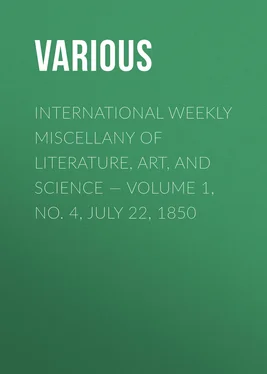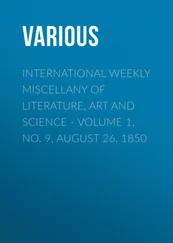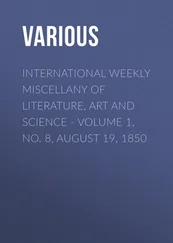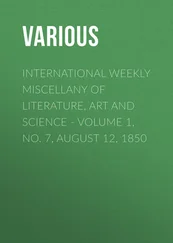Various - International Weekly Miscellany of Literature, Art, and Science — Volume 1, No. 4, July 22, 1850
Здесь есть возможность читать онлайн «Various - International Weekly Miscellany of Literature, Art, and Science — Volume 1, No. 4, July 22, 1850» — ознакомительный отрывок электронной книги совершенно бесплатно, а после прочтения отрывка купить полную версию. В некоторых случаях можно слушать аудио, скачать через торрент в формате fb2 и присутствует краткое содержание. Жанр: foreign_antique, periodic, foreign_edu, на английском языке. Описание произведения, (предисловие) а так же отзывы посетителей доступны на портале библиотеки ЛибКат.
- Название:International Weekly Miscellany of Literature, Art, and Science — Volume 1, No. 4, July 22, 1850
- Автор:
- Жанр:
- Год:неизвестен
- ISBN:нет данных
- Рейтинг книги:4 / 5. Голосов: 1
-
Избранное:Добавить в избранное
- Отзывы:
-
Ваша оценка:
- 80
- 1
- 2
- 3
- 4
- 5
International Weekly Miscellany of Literature, Art, and Science — Volume 1, No. 4, July 22, 1850: краткое содержание, описание и аннотация
Предлагаем к чтению аннотацию, описание, краткое содержание или предисловие (зависит от того, что написал сам автор книги «International Weekly Miscellany of Literature, Art, and Science — Volume 1, No. 4, July 22, 1850»). Если вы не нашли необходимую информацию о книге — напишите в комментариях, мы постараемся отыскать её.
International Weekly Miscellany of Literature, Art, and Science — Volume 1, No. 4, July 22, 1850 — читать онлайн ознакомительный отрывок
Ниже представлен текст книги, разбитый по страницам. Система сохранения места последней прочитанной страницы, позволяет с удобством читать онлайн бесплатно книгу «International Weekly Miscellany of Literature, Art, and Science — Volume 1, No. 4, July 22, 1850», без необходимости каждый раз заново искать на чём Вы остановились. Поставьте закладку, и сможете в любой момент перейти на страницу, на которой закончили чтение.
Интервал:
Закладка:
The importance in which such ladies and such societies were held, not merely in France but in all Europe, may be judged of from the fact, that the breach between Deffant and her young companion was treated in some measure as a public European event. The French minister and foreign ambassadors took part in it, and the whole literary world felt its effect. After this breach there were two tone-giving tribunals for the guidance of public opinion in matters of literature and taste, and their decisions were circulated by letter over all Europe. Horace Walpole, Hénault, Montesquieu. Voltaire, whose correspondence with Deffant has been published in the present century, remained true to her cause. D'Alembert, whose correspondence with Deffant, as well as that of the Duchess of Maine, have also been published in our century, went over to L'Espinasse. This academician, whose name and influence was next in importance to that of Voltaire, formed the nucleus of a new society in the house of L'Espinasse, and was grievously tormented by his inamorata , who pursued one plan of conquest after another when she saw one scheme of marriage after another fail of success. It appears from the whole of the transactions and consequences connected with this breach, however surprising it may be, that this formation of a new circle in Paris for evening entertainment may be with truth compared to the institution of a new academy for the promotion of European culture and refinement. The Duchess of Luxembourg, who continued to be a firm friend of Deffant, took upon herself to provide suitable apartments for the society, whilst the minister of the day (the Duc de Choiseul) prevailed upon the king to grant a pension of no inconsiderable amount to L'Espinasse.
This new circle was the point of union for all the philosophical reformers. Here D'Alembert and Diderot led the conversation; and the renowned head of the political economists, Türgot, who was afterward minister of state, was a member of this bolder circle of men who became celebrated and ill-renowned under the name of Encyclopædists. We shall enter upon a fuller consideration of the tone and taste which reigned in this assembly, as well as in the society which met in the house of Holbach, and of the history of the Encyclopædia, in the following period, and shall only now mention at the conclusion of the present, and that very slightly, some of the other clever societies of Parisians who were all in their day celebrated in Europe. It is scarcely possible for us to judge of the charm which these societies possessed in the great world. This may be best learned from their own writings and conversation, a specimen of which may be found in Marmontel's 'Memoirs,' and formed the subject of a conversation between him and the Duke of Brunswick (who fell at Jena in 1806) and his duchess.
The society of beaux esprits which met at the house of Madame de Poplinière, in the time of Madame de Tencin, was only short-lived, like the good fortune of the lady herself. In her house there assembled members of the great world who were addicted to carousing and debauchery, and learned men who sought to obtain their favor and approbation. The same sort of society was afterward kept up in the house of Holbach. A smaller society, which frequented the house of the farmer-general Pelletier, consisted of unmarried people, who were known as persons who indulged in malicious and licentious conversation. Collé, the younger Crébillon and Bernard, who, notwithstanding his helplessness, was called le gentil , played the chief characters in this reunion, and the Gascon nature of Marmontel, which was always forward and intrusive, helped him into this society also. Baron Holbach, who was a native of the Palatinate, and the able Helvetius who was wanton merely from vanity, brought together expressly and intentionally at a later period, around their well-spread table, all those who declared open war against religion and morality. We must, however, return to these men in the following period.
Holbach for a whole quarter of a century had regular dinner-parties on Sundays, which are celebrated in the history of atheism. All those were invited, who were too bold and too out-spoken for Geoffrin; and even D'Alembert also at a later period withdrew from their society.
Grimm, whose copious correspondence has also been published in the nineteenth century, gives minutes and notices of all the memorable sayings and doings that served to entertain and occupy the polite world in Europe. Grimm also entertained and feasted these distinguished gentlemen. He was not at that time consul for Gotha, or employed and paid by that court or the Empress Catherine to collect Parisian anecdotes, neither had he then been made a baron, but was merely civil secretary of Count von Friese. Both J.J. Rousseau and Buffon belonged at first to these societies; but the former, in great alarm, broke off all intercourse with the people who then played the first parts in Paris, and the other quietly retired.
THE ATHENÆUM UPON HAWTHORNE. 2 2 The Scarlet Letter: a Romance. By Nathaniel Hawthorne. Boston: Ticknor & Co.
The London Athenæum , of the 15th June, has the following remarks upon the last work of NATHANIEL HAWTHORNE:
"This is a most powerful and painful story. Mr. Hawthorne must be well known to our readers as a favorite of the Athenæum . We rate him as among the most original and peculiar writers of American fiction. There in his works a mixture of Puritan reserve and wild imagination, of passion and description, of the allegorical and the real, which some will fail to understand, and which others will positively reject,—but which, to ourselves, is fascinating, and which entitles him to be placed on a level with Brockden Brown and the author of 'Rip Van Winkle.' 'The Scarlet Letter' will increase his reputation with all who do not shrink from the invention of the tale; but this, as we have said, is more than ordinarily painful. When we have announced that the three characters are a guilty wife, openly punished for her guilt,—her tempter, whom she refuses to unmask, and who during the entire story carries a fair front and an unblemished name among his congregation,—and her husband, who, returning from a long absence at the moment of her sentence, sits himself down betwixt the two in the midst of a small and severe community to work out his slow vengeance on both under the pretext of magnanimous forgiveness,—when we have explained that 'The Scarlet Letter' is the badge of Hester Prynne's shame, we ought to add that we recollect no tale dealing with crime so sad and revenge so subtly diabolical, that is at the same time so clear of fever and of prurient excitement. The misery of the woman is as present in every page as the heading which in the title of the romance symbolizes her punishment. Her terrors concerning her strange elvish child present retribution in a form which is new and natural:—her slow and painful purification through repentance is crowned by no perfect happiness, such as awaits the decline of those who have no dark and bitter past to remember. Then, the gradual corrosion of heart of Dimmesdale, the faithless priest, under the insidious care of the husband, (whose relationship to Hester is a secret known only to themselves,) is appalling; and his final confession and expiation are merely a relief, not a reconciliation. We are by no means satisfied that passions and tragedies like these are the legitimate subjects for fiction: we are satisfied that novels such as 'Adam Blair,' and plays such as 'The Stranger,' maybe justly charged with attracting more persons than they warn by their excitement. But if Sin and Sorrow in their most fearful forms are to be presented in any work of art, they have rarely been treated with a loftier severity, purity, and sympathy than in Mr. Hawthorne's 'Scarlet Letter.' The touch of the fantastic befitting a period of society in which ignorant and excitable human creatures conceived each other and themselves to be under the direct 'rule and governance' of the Wicked One, is most skillfully administered. The supernatural here never becomes grossly palpable:—the thrill is all the deeper for its action being indefinite, and its source vague and distant."
Читать дальшеИнтервал:
Закладка:
Похожие книги на «International Weekly Miscellany of Literature, Art, and Science — Volume 1, No. 4, July 22, 1850»
Представляем Вашему вниманию похожие книги на «International Weekly Miscellany of Literature, Art, and Science — Volume 1, No. 4, July 22, 1850» списком для выбора. Мы отобрали схожую по названию и смыслу литературу в надежде предоставить читателям больше вариантов отыскать новые, интересные, ещё непрочитанные произведения.
Обсуждение, отзывы о книге «International Weekly Miscellany of Literature, Art, and Science — Volume 1, No. 4, July 22, 1850» и просто собственные мнения читателей. Оставьте ваши комментарии, напишите, что Вы думаете о произведении, его смысле или главных героях. Укажите что конкретно понравилось, а что нет, и почему Вы так считаете.












